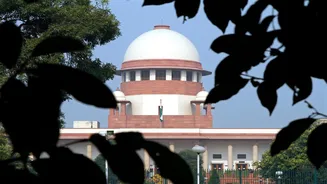What is the story about?
The Supreme Court on Monday (November 3) said it would pass the order in the stray dogs case on November 7.
A three-judge special bench comprising Justices Vikram Nath, Sandeep Mehta, and NV Anjaria noted that chief secretaries of most of the states and Union Territories were present before it.
It allowed an exemption application filed by the chief secretary of Kerala and noted that a principal secretary of the state was present in the court.
The Bench said the Animal Welfare Board of India can be made a party in the matter.
At the outset, Solicitor General Tushar Mehta informed the bench that most of the states and UTs have filed their compliance affidavit in the matter.
"List for orders on November 7," the bench said.
It said the personal presence of the chief secretaries of states and UTs would no longer be required.
However, the bench said their presence would again be necessary in case there was any default in compliance of the orders passed by the court. While hearing the matter on October 27, the top court had directed the chief secretaries of states and UTs, except West Bengal and Telangana, to remain present before it on November 3 to explain why compliance affidavits were not filed despite the court's August 22 order.
The apex court on August 22 asked the states and UTs about the steps being taken for compliance of the Animal Birth Control (ABC) Rules.
The bench had expressed displeasure over the non-compliance of its order and observed that by October 27, compliance affidavits were not filed by the states and UTs, except West Bengal, Telangana, and the Municipal Corporation of Delhi (MCD).
It had made clear that the chief secretaries would have to appear in the court and explain why no compliance affidavits were filed by them.
On October 27, the top court had slammed the states and UTs, which had not filed their compliance affidavits in the matter, and said continuous incidents were happening and the country was being "shown as down" in foreign nations.
The apex court had earlier expanded the scope of the stray dogs case beyond the confines of Delhi-National Capital Region, and directed that all states and UTs be made parties in the matter.
It had directed the municipal authorities to file an affidavit of compliance with complete statistics of resources like dog pounds, veterinarians, dog-catching personnel, and specially-modified vehicles and cages available as on date for the purpose of compliance of the ABC Rules.
The bench had also impleaded the states and UTs in the matter while observing that the application of the ABC Rules was uniform all over India.
The apex court is hearing a suo motu case, which was initiated on July 28 over a media report on stray dog bites leading to rabies, particularly among children, in the national capital.
A three-judge special bench comprising Justices Vikram Nath, Sandeep Mehta, and NV Anjaria noted that chief secretaries of most of the states and Union Territories were present before it.
It allowed an exemption application filed by the chief secretary of Kerala and noted that a principal secretary of the state was present in the court.
The Bench said the Animal Welfare Board of India can be made a party in the matter.
At the outset, Solicitor General Tushar Mehta informed the bench that most of the states and UTs have filed their compliance affidavit in the matter.
"List for orders on November 7," the bench said.
It said the personal presence of the chief secretaries of states and UTs would no longer be required.
However, the bench said their presence would again be necessary in case there was any default in compliance of the orders passed by the court. While hearing the matter on October 27, the top court had directed the chief secretaries of states and UTs, except West Bengal and Telangana, to remain present before it on November 3 to explain why compliance affidavits were not filed despite the court's August 22 order.
The apex court on August 22 asked the states and UTs about the steps being taken for compliance of the Animal Birth Control (ABC) Rules.
The bench had expressed displeasure over the non-compliance of its order and observed that by October 27, compliance affidavits were not filed by the states and UTs, except West Bengal, Telangana, and the Municipal Corporation of Delhi (MCD).
It had made clear that the chief secretaries would have to appear in the court and explain why no compliance affidavits were filed by them.
On October 27, the top court had slammed the states and UTs, which had not filed their compliance affidavits in the matter, and said continuous incidents were happening and the country was being "shown as down" in foreign nations.
The apex court had earlier expanded the scope of the stray dogs case beyond the confines of Delhi-National Capital Region, and directed that all states and UTs be made parties in the matter.
It had directed the municipal authorities to file an affidavit of compliance with complete statistics of resources like dog pounds, veterinarians, dog-catching personnel, and specially-modified vehicles and cages available as on date for the purpose of compliance of the ABC Rules.
The bench had also impleaded the states and UTs in the matter while observing that the application of the ABC Rules was uniform all over India.
The apex court is hearing a suo motu case, which was initiated on July 28 over a media report on stray dog bites leading to rabies, particularly among children, in the national capital.





















